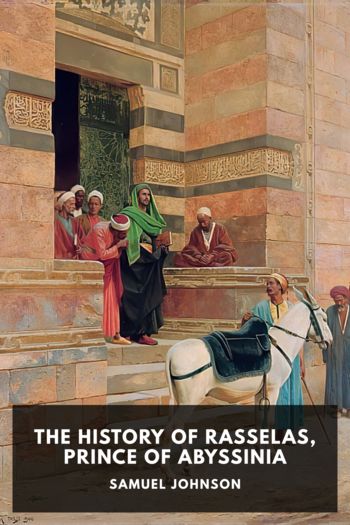The History of Rasselas, Prince of Abyssinia - Samuel Johnson (best novel books to read .TXT) 📗

- Author: Samuel Johnson
Book online «The History of Rasselas, Prince of Abyssinia - Samuel Johnson (best novel books to read .TXT) 📗». Author Samuel Johnson
After this he lifted up his head, and seeing the moon rising, walked towards the palace. As he passed through the fields, and saw the animals around him, “Ye,” said he, “are happy, and need not envy me that walk thus among you, burdened with myself; nor do I, ye gentle beings, envy your felicity; for it is not the felicity of man. I have many distresses from which you are free; I fear pain when I do not feel it; I sometimes shrink at evils recollected, and sometimes start at evils anticipated: surely the equity of Providence has balanced peculiar sufferings with peculiar enjoyments.”
With observations like these the Prince amused himself as he returned, uttering them with a plaintive voice, yet with a look that discovered him to feel some complacence in his own perspicacity, and to receive some solace of the miseries of life from consciousness of the delicacy with which he felt and the eloquence with which he bewailed them. He mingled cheerfully in the diversions of the evening, and all rejoiced to find that his heart was lightened.
III The Wants of Him That Wants NothingOn the next day, his old instructor, imagining that he had now made himself acquainted with his disease of mind, was in hope of curing it by counsel, and officiously sought an opportunity of conference, which the Prince, having long considered him as one whose intellects were exhausted, was not very willing to afford. “Why,” said he, “does this man thus intrude upon me? Shall I never be suffered to forget these lectures, which pleased only while they were new, and to become new again must be forgotten?” He then walked into the wood, and composed himself to his usual meditations; when, before his thoughts had taken any settled form, he perceived his pursuer at his side, and was at first prompted by his impatience to go hastily away; but being unwilling to offend a man whom he had once reverenced and still loved, he invited him to sit down with him on the bank.
The old man, thus encouraged, began to lament the change which had been lately observed in the Prince, and to inquire why he so often retired from the pleasures of the palace to loneliness and silence. “I fly from pleasure,” said the Prince, “because pleasure has ceased to please: I am lonely because I am miserable, and am unwilling to cloud with my presence the happiness of others.”
“You, sir,” said the sage, “are the first who has complained of misery in the Happy Valley. I hope to convince you that your complaints have no real cause. You are here in full possession of all the Emperor of Abyssinia can bestow; here is neither labour to be endured nor danger to be dreaded, yet here is all that labour or danger can procure or purchase. Look round and tell me which of your wants is without supply: if you want nothing, how are you unhappy?”
“That I want nothing,” said the Prince, “or that I know not what I want, is the cause of my complaint: if I had any known want, I should have a certain wish; that wish would excite endeavour, and I should not then repine to see the sun move so slowly towards the western mountains, or to lament when the day breaks, and sleep will no longer hide me from myself. When I see the kids and the lambs chasing one another, I fancy that I should be happy if I had something to pursue. But, possessing all that I can want, I find one day and one hour exactly like another, except that the latter is still more tedious than the former. Let your experience inform me how the day may now seem as short as in my childhood, while nature was yet fresh, and every moment showed me what I never had observed before. I have already enjoyed too much: give me something to desire.”
The old man was surprised at this new species of affliction, and knew not what to reply, yet was unwilling to be silent. “Sir,” said he, “if you had seen the miseries of the world, you would know how to value your present state.”
“Now,” said the Prince, “you have given me something to desire. I shall long to see the miseries of the world, since the sight of them is necessary to happiness.”
IV The Prince Continues to Grieve and MuseAt this time the sound of music proclaimed the hour of repast, and the conversation was concluded. The old man went away sufficiently discontented to find that his reasonings had produced the only conclusion which they were intended to prevent. But in the decline of life, shame and grief are of short duration: whether it be that we bear easily what we have borne long; or that, finding ourselves in age less regarded, we less regard others; or that we look with slight regard upon afflictions to which we know that the hand of death is about to put





Comments (0)